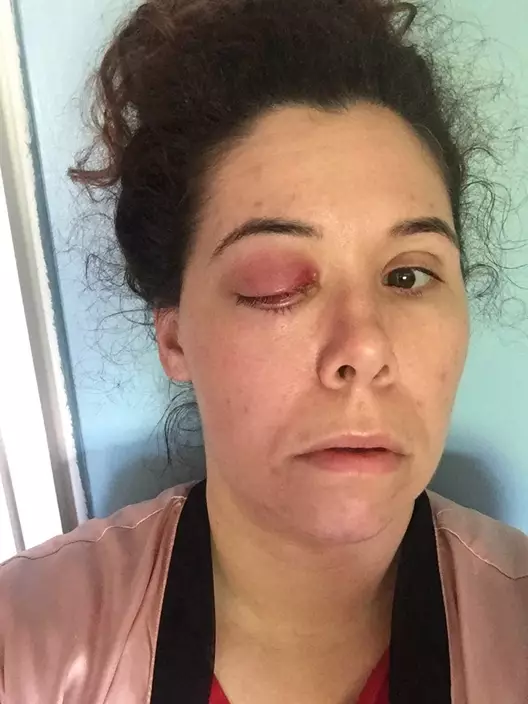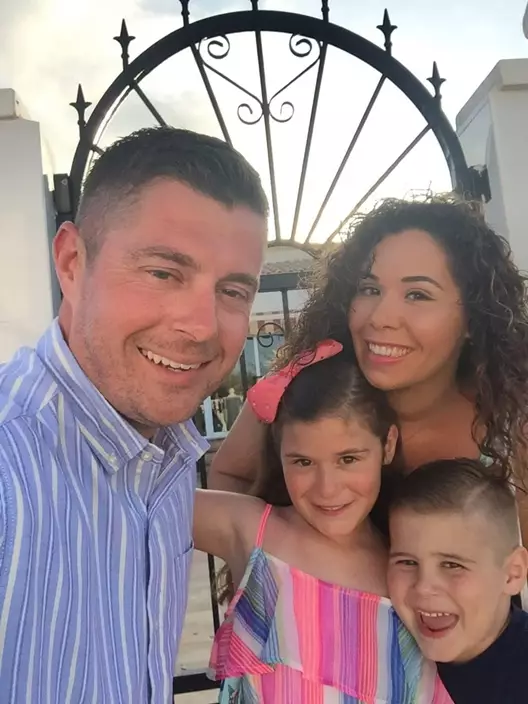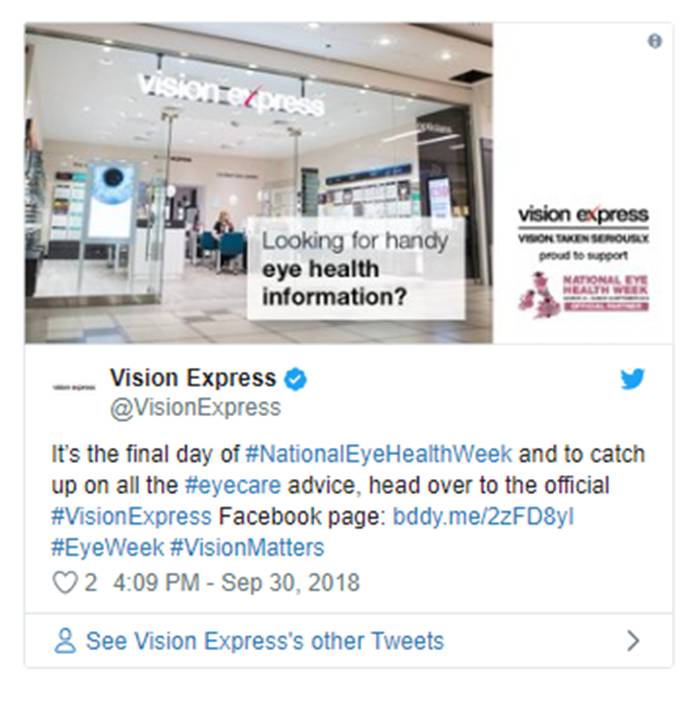Janna filmed a moving video urging other busy parents to visit the optician – and it’s already had 15,000 views.
A mum who neglected her own health to look after her son learned she had cancer which led to her losing her right eye, the day before he was given the all-clear after battling leukemia.
Click to Gallery
Janna filmed a moving video urging other busy parents to visit the optician – and it’s already had 15,000 views.
But, rather than looking for pity, Janna wants her story to act as a cautionary tale to others, who are putting health checks off.
She added: “Call me ignorant, but I never knew you could get eye cancer. Going to the optician is not just about getting glasses, it’s about your eye health.”
“We’d been up to the accident and emergency department around 12 times before he was finally diagnosed in October, aged three,” said Janna.
Told treatment needed to start straight away and referred back to the NHS, little George started three grueling years of chemotherapy.
But, in November 2017, when she started getting headaches every day and her energy hit an all-time low, she finally visited her GP.
She said: “He coaxed me, saying, ‘Why don’t you just go to Vision Express here and get them tested?’
The alarmed optician referred Janna to London’s Moorfield Eye Hospital and a month later, she received the devastating news that there was a 7.8mm tumor inside her right eye, called a uveal melanoma.
Telling her children that Mummy had a poorly eye, so was “getting a new one” was one of the hardest things she had ever done.
She added: “I had all the symptoms of eye cancer, but just did not read my body. I didn’t recognize what was going on.
Bravely taking off her sunglasses in a moving video, urging other busy parents to visit the optician and not neglect their own health, posting it to Facebook, Janna Clark, 36, of Harold Wood, Essex, says it has already attracted 15,000 views.
Former hairdresser Janna, whose son, George Wyatt, now seven, fought leukemia – a cancer of the white blood cells- for three years, recalled her horror at being told in February that she had a 7.8mm tumor in her right eye, saying: “I was in complete shock.”
She continued: “On 23 February 2018, George rang the bell on his hospital ward, to show he was cancer free. and it should have been an iconic and amazing day for us.
“Unfortunately, the day before I got the heartbreaking news that I had eye cancer.
“I didn’t know what was going to be happening, I didn’t know my course of treatment, all I felt was that moment of joy for our family had been taken away, yet again, by this cruel disease.”

Janna after she had her eye removed (Collect/PA Real Life)
But, rather than looking for pity, Janna wants her story to act as a cautionary tale to others, who are putting health checks off.
She said: “The moral to this is, if I had got seen quicker I would probably still have my eye.
“Now I want parents or carers to remember to look after themselves while they are looking after others. As a parent or a carer, you put yourself on the back-burner. I had headaches for over a year, but I thought I was tired and stressed out because I was looking after everybody.”

George during his cancer treatment (Collect/PA Real Life)
She added: “Call me ignorant, but I never knew you could get eye cancer. Going to the optician is not just about getting glasses, it’s about your eye health.”
Janna, who lives with George, her daughter, Bonnie Wyatt, 10, and their dad, security engineer Jay Wyatt, 40, also admitted to ignoring tell-tale signs, like headaches and blurred vision, as she looked after her son.
He was diagnosed with leukemia in October 2014, after suffering from constant infections, including streaming colds and suspected asthma, which affects the breathing.

Jay and Janna with children George and Bonnie before her diagnosis (Collect/PA Real Life)
“We’d been up to the accident and emergency department around 12 times before he was finally diagnosed in October, aged three,” said Janna.
“As a mum, I knew something wasn’t right with him.”
Able to get a diagnosis on the NHS after a private consultation at Spire Hartswood Hospital in Brentwood, Essex – an early Christmas present from her mum Maggie Irvine, 73 – Janna and Jay were told their little boy had acute lymphoblastic leukemia, an aggressive form of the disease.

Janna after she had her eye removed (Collect/PA Real Life)
Told treatment needed to start straight away and referred back to the NHS, little George started three grueling years of chemotherapy.
“It was totally devastating for us,” Janna said.
“When we were told I just lay on the floor and cried and screamed, I couldn’t believe it was true.”
 Supporting her son left Janna with little time to worry about herself and when her vision blurred, she dismissed it as stress.
Supporting her son left Janna with little time to worry about herself and when her vision blurred, she dismissed it as stress.
“I am ashamed to say the last time I’d had a sight test was nine years before the one that detected something was amiss,” she said.
“I’d had laser eye surgery aged 21 to correct my sight because I needed glasses and the blurred vision I suffered with in recent years was, I thought, down to migraines, nothing more.”

George now (Collect/PA Real Life)
But, in November 2017, when she started getting headaches every day and her energy hit an all-time low, she finally visited her GP.
Told to get a blood test, Janna admits she was too preoccupied with the final months of her boy’s treatment and forgot all about it.
Then, she was shopping in the January sales at Lakeside in Grays, Essex, when Jay, who she has been with for 14 years, finally persuaded her to get her eyes tested.

Janna and Jay before her diagnosis (Collect/PA Real Life)
She said: “He coaxed me, saying, ‘Why don’t you just go to Vision Express here and get them tested?’
“I’d not been in a good way over Christmas, shutting one eye without even knowing it and losing some of my peripheral vision.
“So I told the assistant I was never without a headache, had blurred and saw flashing lights sometimes so big when I was driving that I thought they were a car.”

Janna and Jay before her diagnosis (Collect/PA Real Life)
The alarmed optician referred Janna to London’s Moorfield Eye Hospital and a month later, she received the devastating news that there was a 7.8mm tumor inside her right eye, called a uveal melanoma.
Told she would need proton beam therapy – a type of radiotherapy, which can cause less damage to surrounding tissue but is not widely available in the UK, she was referred to The Clatterbridge Cancer Centre in Liverpool for treatment.
But there, just two days into the four-day treatment, doctors discovered her retina had become badly detached.
Sadly, reattaching it came with a high chance of spreading cancer, meaning the only option left for Janna was to have the eye removed.

Janna before her diagnosis (Collect/PA Real Life)
Telling her children that Mummy had a poorly eye, so was “getting a new one” was one of the hardest things she had ever done.
Since going under the knife on May 14, Janna has experienced some complications with wearing the prosthetic eye, so is currently wearing an ocular conformer – a temporary acrylic plastic shield used to protect the healing eye socket.
Luckily, her ordeal has not been in vain, as both she and George have now had the all clear, fuelling her mission to make sure everyone has regular eye checks.

Janna before her diagnosis (Collect/PA Real Life)
She added: “I had all the symptoms of eye cancer, but just did not read my body. I didn’t recognize what was going on.
“I had constant headaches, dizzy spells, was always tired, had stabbing pain and blurred blobs in my eyes, but I just thought they were migraines. Please watch my video and please share it, it could save a life.”
Jay Ghadiali, director of professional services at Vision Express, is also keen to stress the importance of eye testing, saying: “As Janna’s story highlights, even if you believe your vision is fine, it is still crucial to get a regular eye test, and the NHS recommends one at least every two years.

Jay and Janna with children George and Bonnie after her eye removal surgery (Collect/PA Real Life)
“Janna is not alone – 13.8 million Brits don’t have regular eye tests and over 2.3 million believe they should only head to an optician when they start having problems or experiencing pain.
“The value of sight checks is as a preventative step to safeguard vision for life. While Janna’s experience is understandably shocking, it’s a tribute to her bravery that she’s using it to reach out to others and inspire them to make positive changes and prioritize eye tests.”
DES MOINES, Iowa (AP) — Stung by paying billions of dollars for settlements and trials, chemical giant Bayer has been lobbying lawmakers in three states to pass bills providing it a legal shield from lawsuits that claim its popular weedkiller Roundup causes cancer.
Nearly identical bills introduced in Iowa, Missouri and Idaho this year — with wording supplied by Bayer — would protect pesticide companies from claims they failed to warn that their product causes cancer, if their labels otherwise complied with the U.S. Environmental Protection Agency’s regulations.
But legal experts warn the legislation could have broader consequences — extending to any product liability claim or, in Iowa’s case, providing immunity from lawsuits of any kind. Critics say it could spread nationwide.
"It’s just not good government to give a company immunity for things that they’re not telling their consumers,” said Matt Clement, a Jefferson City, Missouri, attorney who represents people suing Bayer. “If they’re successful in getting this passed in Missouri, I think they’ll be trying to do this all over the country.”
Bayer described the legislation as one strategy to address the “headwinds” it faces. About 167,000 legal claims against Bayer assert Roundup causes a cancer called non-Hodgkin’s lymphoma, which Bayer disputes. The company has won some cases, settled many others but also has suffered several losses in which juries awarded huge initial judgments. It has paid about $10 billion while thousands of claims linger in court.
Though some studies associate Roundup's key ingredient with cancer, the EPA has regularly concluded it is not likely to be carcinogenic to humans when used as directed.
The costs of “defending a safe, approved product” are unsustainable, said Jess Christiansen, head of communications for Bayer's crop science division.
The legislation was introduced in targeted states pivotal to Bayer's Roundup operations and is at a different stage in each. It passed the Iowa Senate, is awaiting debate in the Missouri House and was defeated in Idaho, where this year's legislative session ended.
Farmers overwhelmingly rely on Roundup, which was introduced 50 years ago as a more efficient way to control weeds and reduce tilling and soil erosion. For crops like corn, soybeans and cotton, it’s designed to work with genetically modified seeds that resist Roundup’s deadly effect.
Missouri state Rep. Dane Diehl, a farmer who worked with Bayer to sponsor the legislation, cited concerns that costly lawsuits could force Bayer to pull Roundup from the U.S. market, leaving farmers to depend on alternative chemicals from China.
“This product, ultimately, is a tool that we need," said Diehl, a Republican.
Iowa Gov. Kim Reynolds, a Republican, said in an email the legislation maintains the integrity of the regulatory process and, without it, “Iowa risks losing hundreds of jobs” in Muscatine, an eastern Iowa city where Roundup is mostly produced.
The Associated Press is seeking public records on Bayer’s communications with governor's offices in Iowa, Missouri and Idaho.
Bayer, like other companies, hires lobbyists in states to advocate for its interests. The company backs this legislation in the states where “we have a big, direct economic impact,” Christiansen said.
Roundup’s key ingredient, glyphosate, is derived from phosphate mined in Idaho. And St. Louis is the headquarters of its North America crop science division, acquired in its 2018 purchase of Monsanto. Because of that, many of the lawsuits are filed in Missouri.
The five lobbyists registered for Bayer in Iowa and three in Idaho is largely consistent with recent years, but the number working in Missouri this year ballooned from four to nine. Lobbyist expenditures exceeded $8,000 in Idaho this year; similar information was not available in Iowa or Missouri.
Led by Bayer, a coalition of agricultural organizations called Modern Ag Alliance also is spending tens of thousands of dollars on radio and print advertisements claiming that trial lawyers and litigation threaten the availability of glyphosate.
On its website, the group asserts that at risk are 500 jobs connected to glyphosate production in Iowa, and 800 jobs in Idaho.
Bayer stopped short of threatening closures. The Iowa facilities, including in Muscatine, “are very critical facilities to our business, so we'll remain at some sort of support level,” Christiansen said.
At issue in the lawsuits and legislation is how Bayer – and any other pesticide company — communicates with consumers about the safety of its products.
Companies are required to register products with the EPA, which evaluates — and then reevaluates every 15 years — a pesticide and its label. The EPA reiterated in 2020 that glyphosate used as directed posed no health risks to humans. But a federal appeals court panel in 2022 ruled that decision “was not supported by substantial evidence” and ordered the EPA to review further.
The debate over glyphosate escalated when a 2015 report by the International Agency for Research on Cancer, part of the World Health Organization, said it's “probably carcinogenic to humans" based on “limited” evidence of cancer in people and “sufficient” evidence in study animals.
Based on that international report, California sought to add a cancer warning label to products containing glyphosate. But a federal appeals court ruled against California last November, concluding such a warning wasn't factual.
Christiansen emphasized that many regulatory agencies worldwide agree with the EPA and insisted Bayer has to stick to EPA labeling to ensure it isn't providing false or misleading information. She added that the company is transparent in the information it does provide.
Critics of the legislation aren't convinced, citing examples such as opioids and asbestos that had been deemed safe for use as directed — until they weren't.
There also are concerns that the legislation could stifle any product liability claim since most rely on the argument that a company failed to warn, said Andrew Mertens, executive director of the Iowa Association for Justice, an organization for trial lawyers.
Jonathan Cardi, a product liability and torts expert at Wake Forest University School of Law, also said a strict reading of the Iowa legislation extends beyond liability claims, and “the way it’s drafted makes it interpretable to mean nobody could bring any suit.”
In lobbying lawmakers and in speaking with the AP, Bayer representatives disputed that the legislation would cut off other legal actions. Several legal experts said the legislation is unlikely to affect the 18,000 lawsuits already pending in Missouri’s capital of Jefferson City, and wouldn’t prevent claims in states that don’t adopt similar legislation.
In Idaho, the Republican-led Senate narrowly defeated the bill amid concerns about relying on federal agencies' safety standards and limiting the ability of harmed individuals to sue.
John Gilbert, who farms in Iowa Falls, Iowa, with limited use of Roundup, called Republicans hypocritical for attempting to protect corporate interests after campaigning on standing up for Iowans.
The bill “invites a lot of reckless disregard," said Gilbert, who is on the board for the Iowa Farmers Union. “No amount of perfume’s gonna make it anything but a skunk."
Lieb reported from Jefferson City, Missouri.

FILE - Soybeans are seen in a field on a farm, Friday, Sept. 2, 2016, in Iowa. The maker of a popular weedkiller is turning to lawmakers in key states to try to squelch legal claims that it failed to warn about cancer risks. (AP Photo/Charlie Neibergall, File)

FILE - The Bayer AG corporate logo is displayed on a building of the German drug and chemicals company in Berlin, Monday, May 23, 2016. Bayer, the maker of a popular weedkiller, is turning to lawmakers in key states to try to squelch legal claims that it failed to warn about cancer risks. Bayer disputes such claims but already has paid about $10 billion to resolve them. (AP Photo/Markus Schreiber, File)

FILE - Phosphate ore is dug up and transported from Monsanto Company's South Rasmussen Mine site near Soda Springs, Idaho, July 16, 2009. Bayer acquired Monsanto in 2018. Bayer, the maker of a popular weedkiller, is turning to lawmakers in key states to try to squelch legal claims that it failed to warn about cancer risks. The company disputes such claims. A key ingredient of the weedkiller, glyphosate, is derived from phosphate mined in Idaho. (Bill Schaefer/The Idaho State Journal via AP, File)

FILE - Containers of Roundup are displayed on a store shelf in San Francisco, Feb. 24, 2019. Thousands of legal claims against drug and chemicals company Bayer assert Roundup causes a cancer called non-Hodgkin’s lymphoma, which Bayer disputes. (AP Photo/Haven Daley, File)

FILE - A soybean field is sprayed in Iowa, July 11, 2013. The maker of a popular weedkiller is turning to lawmakers in key states to try to squelch legal claims that it failed to warn about cancer risks. (AP Photo/Charlie Neibergall, File)




 Supporting her son left Janna with little time to worry about herself and when her vision blurred, she dismissed it as stress.
Supporting her son left Janna with little time to worry about herself and when her vision blurred, she dismissed it as stress.


















